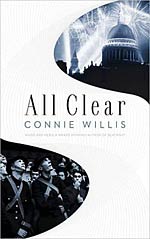
![]() dh65
dh65
8/17/2012
![]()
In my mixed review of Blackout, I said that I hoped it and All Clear, read together, would be worth your time and money. Now that I've finished All Clear, I think the answer is yes, but reservedly. Willis's resolution of all the threads of narrative by the end of All Clear is utterly satisfying. When all is said and done, this two-book novel is a tour de force, a remarkable achievement. But it could and should have been shorter.
The principal criticism of these books seems to be that they are laden with just too much detail. I disagree. The tremendous wealth of detail about England between 1941 and 1945 is a large part of what makes this such a good novel. If you embark on reading these books with the mindset that you're reading a novel that is more about WWII than about the 21st century time travelers, the detail will never bore you. To the contrary, you will remain fascinated.
The flaw in this work, and the reason it feels overly long, is that, particularly in Blackout, Willis uses a handful of characteristic narrative techniques over and over and over again, so that the repetitive rhythm of the sentences and paragraphs becomes predictable and even annoying. As I wrote in my review of Blackout, "A character makes an assumption, finds she's wrong, then makes another, finds it's wrong, ad infinitum. Or a character is hoping for something to happen, thinks it has, then finds out it hasn't, then thinks it has (finally), then finds out it still hasn't, ad infinitum. The characters are tense almost all the time, but their tension isn't mirrored by effective narrative tension so much as by irritation at the repetitiveness."
Ultimately, Willis redeems herself, and I'm glad I stuck with these books. I would recommend them. But I wish Willis had had a more effective editor.
https://www.worldswithoutend.com/novel_review.asp?ID=2240